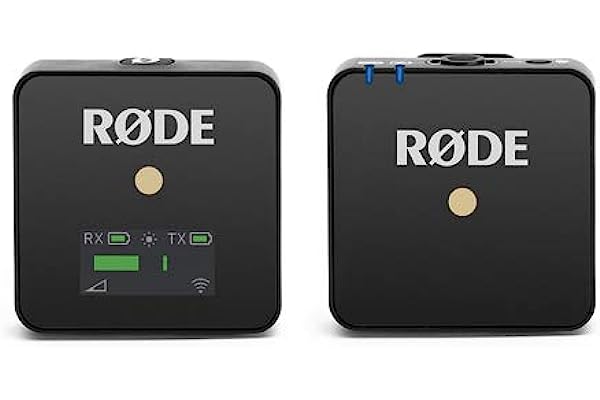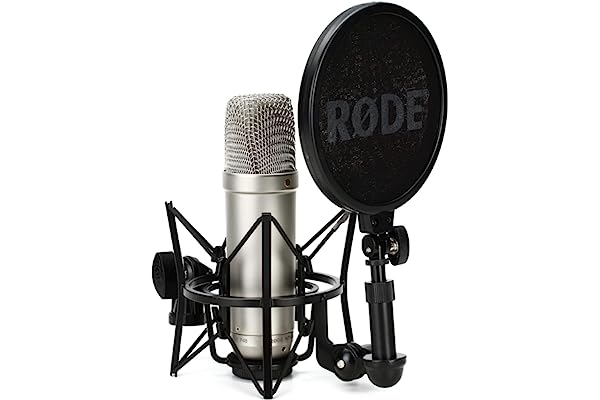Features
Rode Wireless Go

- Combo clip-on microphone or beltpack transmitter for lavalier/headset mic/ built-in omnidirectional condenser mic for broadcast-quality sound
- Audio delivers crystal clear audio under any conditions/ up to 70M range but optimized for shorter-range operation
- Power TX and RX have built-in USB-C rechargeable batteries/ up to 7 hours on a full charge including a battery Saver mode
- Portable super-lightweight and ultra-compact
- Advanced the transmitter and receiver pair in just 3 seconds/ 3-stage output pad 0 -6dB and -12dB/ use up to 8 systems in one location
Rode NT1-A

- Large diaphragm 1” gold-sputtered capsule
- Cardioid polar pattern
- Ultra-low noise, self-noise of only 5dB (A)
- Includes Rode SM6 shock mount, pop filter and dust cover
Introduction
Are you in the market for a new microphone? If so, you’ve come to the right place! In this blog post, we’ll compare two popular microphones: the Rode Wireless Go and the Rode NT1-A Anniversary Vocal Cardioid Condenser Microphone Package. We’ll explore the features, advantages, and disadvantages of each product, helping you make an informed decision.
Rode Wireless Go
The Rode Wireless Go is a compact wireless microphone system with a transmitter and receiver. It is designed for recording audio in a variety of environments, including outdoors and indoors. It is easy to set up and use, and its small size makes it ideal for on-the-go recording.
The Wireless Go is equipped with a long-lasting battery that can last up to seven hours on a full charge. It also has a built-in headphone output for monitoring audio levels and a LED indicator to show battery status. Additionally, it has a range of up to 200 feet, making it suitable for recording in larger spaces.
Advantages
The Wireless Go is an excellent choice for recording audio in a variety of settings. Its long-lasting battery and wide range make it suitable for recording in both indoor and outdoor environments. Additionally, its small size and lightweight design make it easy to transport and set up.
Disadvantages
The Wireless Go is not the best choice for recording high-quality audio. Its sound quality is not as good as other microphones, and its range can be limited in larger spaces. Additionally, its battery life is not as long as other microphones on the market.
Rode NT1-A Anniversary Vocal Cardioid Condenser Microphone Package
The Rode NT1-A Anniversary Vocal Cardioid Condenser Microphone Package is a high-end microphone package designed for recording high-quality audio. It is equipped with a 1” gold-plated diaphragm condenser microphone, a shock mount, and a pop filter. It also has a wide frequency response range of 20Hz to 20kHz.
Advantages
The NT1-A Anniversary Vocal Cardioid Condenser Microphone Package is an excellent choice for recording high-quality audio. Its 1” gold-plated diaphragm condenser microphone and wide frequency response range make it suitable for capturing detailed sounds. Additionally, its shock mount and pop filter help reduce unwanted noise and improve sound quality.
Disadvantages
The NT1-A Anniversary Vocal Cardioid Condenser Microphone Package is not the best choice for recording audio in outdoor environments. Its size and weight make it difficult to transport, and its range is limited to the length of its cable. Additionally, its price tag is much higher than other microphones on the market.
Conclusion
The Rode Wireless Go and the Rode NT1-A Anniversary Vocal Cardioid Condenser Microphone Package are both excellent choices for recording audio. The Wireless Go is a great choice for recording audio in a variety of settings, while the NT1-A is ideal for recording high-quality audio. Ultimately, the decision comes down to your budget and recording needs.
We hope this blog post has helped you make an informed decision when it comes to selecting the perfect microphone for your needs. For more information on these and other microphones, please visit the Rode website.
Specifications / Attributes
| Feature | Rode Wireless Go | Rode NT1-A |
|---|---|---|
| Batteries | 1 D batteries required. (included) | 1 Lithium Ion batteries required. |
| Batteries Included | Yes | No |
| Batteries Required | Yes | No |
| Battery cell composition | Polymer | N/A |
| Brand | Rode Microphones | Rode Microphones |
| Colour Screen | No | N/A |
| Compatible Devices | Headphone | Radio |
| Connector Type | USB | Wired |
| Date First Available | 3 June 2019 | 1 April 2018 |
| Hardware Platform | Headphone | N/A |
| Includes AC Adapter | No | No |
| Includes Rechargeable Battery | Yes | No |
| Is discontinued by manufacturer | N/A | No |
| Is there a timer? | No | N/A |
| Item Model Number | WIGO | NT1 3rd Gen |
| Item Weight | 63.7 g | 2.09 kg |
| Manufacturer | Rode Microphones | Rode |
| Material Type | N/A | Nickel |
| Microphone format | Microphone System | Microphone Only |
| Model | WIGO | NT1 3rd Gen |
| Model Name | Wireless Go | NT1-A |
| Model year | 2019 | 2014 |
| Mounting Hardware | Camera Body Only | microphone |
| Noise level | 21.8 dB | 5 dB |
| Number of items | 1 | 1 |
| Part Number | WIGO | NT-1A |
| Power Source | Battery Powered | AC |
| Product dimensions | 4.53 x 1.85 x 4.3 cm; 63.78 Grams | 27.05 x 21.34 x 17.27 cm; 2.09 Kilograms |
| Signal-to-noise ratio (dB) | 80 dB | 75 dB |
| Special Features | Clip | RODE's NT1-A is one of the world's quietest microphones! Why is that important? Low noise will give your work the dynamics you deserve. Adding noise from any device, especially at the source, only degrades your performance. The NT1-A has a self-noise of only 5 dB-A! The NT1-A can handle 137dB SPL so you can be confident that even in front of loud guitar cabinets, your recording won't distort due to overload. By providing ultra-quiet operation and being versatile enough to handle a wide variety o |
| Standing screen display size | 1 Inches | N/A |
| Check the Best Deal Price Today | Check the Best Deal Price Today |







